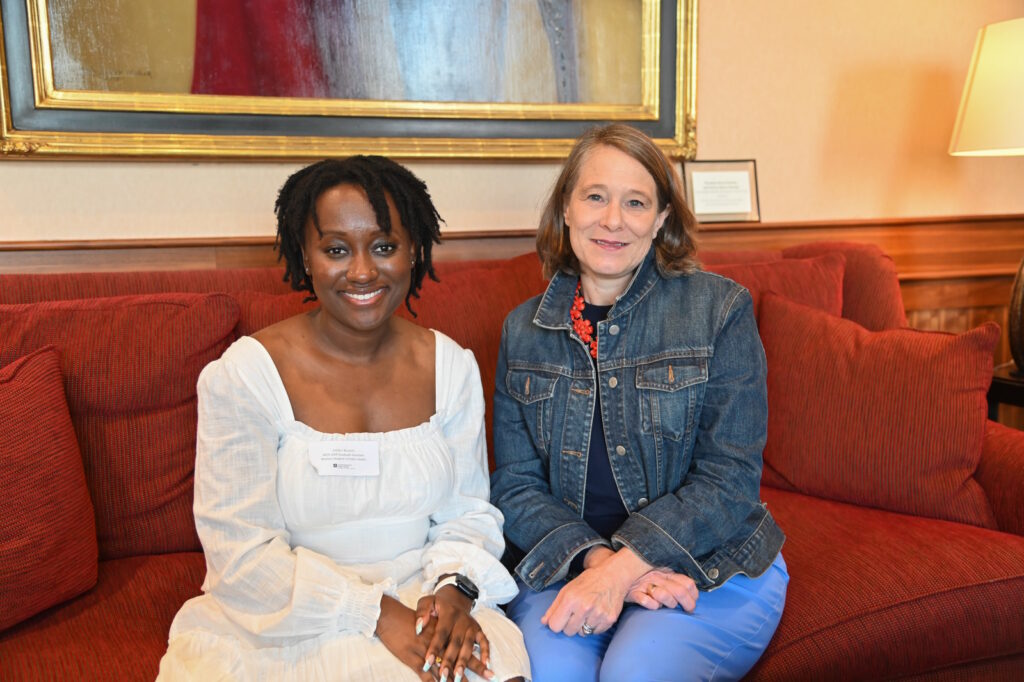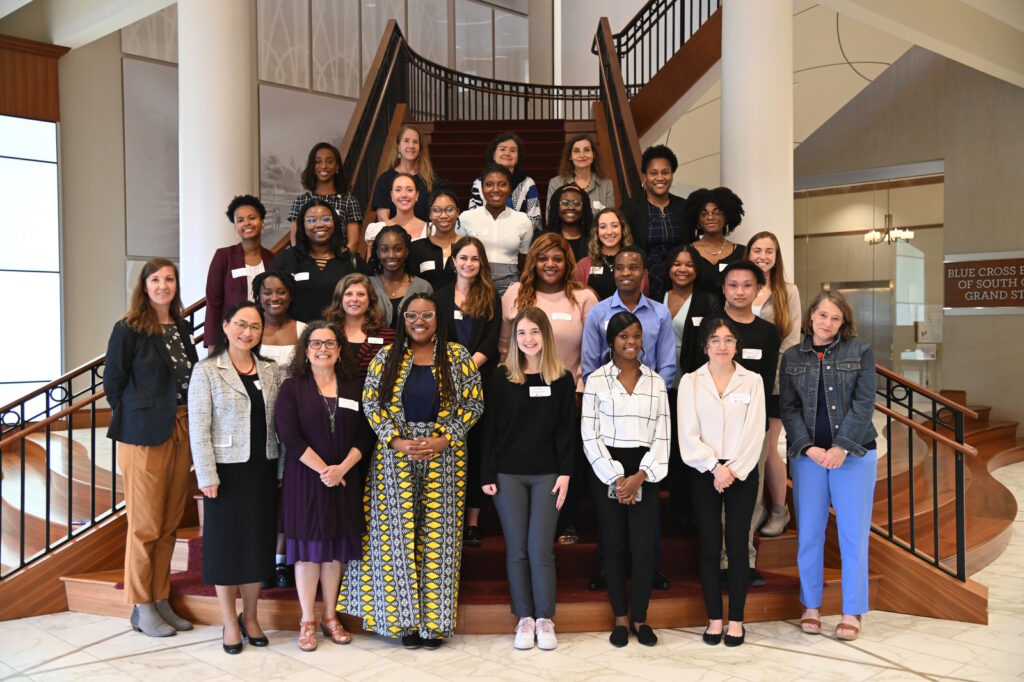The Maternal and Child Health and Leadership, Education, and Advancement in Undergraduate Pathways (MCH LEAP) Spring Summit 2023 empowers students to seize opportunities and seek out mentors for career journeys in maternal and child health.

On April 14, 2023, the MCH LEAP program hosted our second annual Spring Summit, gathering over fifty students, faculty, and administrators from the University of South Carolina (USC) with working professionals in the field of maternal and child health (MCH) here in our state. Dr. Lee Pearson, Associate Dean & Clinical Associate Professor in the Department of Health Promotion, Education, and Behavior gave opening remarks, sharing the University’s commitment to the goals of the MCH programs at USC to foster diversity within the healthcare workforce in order to improve the health and well-being of mothers, children and families among underserved and minority populations.
Our keynote speakers kicked off our Spring Summit with empowering stories of how each seized opportunities to achieve their goals, often through educational programs leading the way in diversity and inclusion. Poignantly, both our speakers and student presenters shared the history and inspiration of the “Granny Midwives” generations of enslaved and then free African American midwives who, by necessity, cared for the health of women and babies during and after childbirth, simultaneously mentoring the next generation of sisters to provide perinatal healthcare in the underserved rural South. Find this photo and more at the following link: https://nmaahc.si.edu/explore/stories/historical-significance-doulas-and-midwives
On April 14, 2023, the MCH LEAP program hosted our second annual Spring Summit, gathering over fifty students, faculty, and administrators from the University of South Carolina (USC) with working professionals in the field of maternal and child health (MCH) here in our state. Dr. Lee Pearson, Associate Dean & Clinical Associate Professor in the Department of Health Promotion, Education, and Behavior gave opening remarks, sharing the University’s commitment to the goals of the MCH programs at USC to foster diversity within the healthcare workforce in order to improve the health and well-being of mothers, children and families among underserved and minority populations.
Our keynote speakers kicked off our Spring Summit with empowering stories of how each seized opportunities to achieve their goals, often through educational programs leading the way in diversity and inclusion. Poignantly, both our speakers and student presenters shared the history and inspiration of the “Granny Midwives” generations of enslaved and then free African American midwives who, by necessity, cared for the health of women and babies during and after childbirth, simultaneously mentoring the next generation of sisters to provide perinatal healthcare in the underserved rural South. Find this photo and more at the following link: https://nmaahc.si.edu/explore/stories/historical-significance-doulas-and-midwives
We were honored to be joined by Dr. Marvella Ford, Professor of Public Health Sciences and Associate Director of Population Sciences, and Endowed Chair in Cancer Disparities at the Medical University of South Carolina (MUSC) Hollings Cancer Center, whose message to our students was to seek out those who would be mentors along their career journeys. Dr. Ford shared research-driven models of mentorship designed to foster career growth, which was a familiar concept for our MCH LEAP students who have met this year with their own faculty and peer mentors. Dr. Ford shared how her own career and experiences mentoring others in the field of maternal and child health began through the mentorship of her high school guidance counselor, propelling her from her small hometown of Plattsburgh, NY to Cornell University, a prestigious institution with a long history of promoting diversity and inclusion.
Dr. Ford’s career was further buoyed by the support of her undergraduate mentor, Dr. Josephine A. Allen, the first African American woman to receive tenure at Cornell, as well as a succession of strong women who guided her next steps at the University of Michigan School of Social Work, her postdoctoral years at the University of Michigan School of Public Health, through Baylor College of Medicine and to her position at the Medical University of South Carolina.
Dr. Kari-Claudia Allen Harrington, MD followed, beginning her presentation by listing her financial disclosures (none), and, by contrast, a disclosure of a rich identity as a “Black American, American Descendant of Slaves, American Descendent of the Stolen and Enslaved People, ADOS, Of African Descent, and a Daughter of the African Diaspora”. Referencing words by the writer Alice Walker, Dr. Allen Harrington reflected on how her identity shaped her mother’s garden and thus the callings of her own. Among the “Lessons from my own garden” shared by Dr. Allen Harrington with our students were to “Write the vision” and “Create a strategy”, which she did in her own career, taking skills and a stronger vision from her undergraduate work at North Carolina Central University, a historically black university, and taking big steps to move to Boston to join a medical school program designed to support diversity in medicine.
Dr. Allen Harrington had our group laughing, according to her maxim “Have Fun” – but also reflecting on how to incorporate her other bits of wisdom – Be bold, Live your purpose, Honor your history, and Support those who come behind you – which she, no doubt, uses regularly to support and guide young resident medical doctors when she puts on her Professor hat as Assistant Professor, Academic Family Medicine Physician at the University of South Carolina School of Medicine, Columbia, and Assistant Program Director of the Family Medicine Residency program at Prisma Health.
We were pleased to be joined for lunch by Ms. Jennifer Bailey, Senior Director of Operations and Programs at the SC Area Health Education Consortium (AHEC), who followed our keynote speaker’s wisdom by sharing her knowledge of opportunity: the wealth of resources and opportunity that is AHEC. Ms. Bailey explained how the agency works through four regional centers across South Carolina to build a diverse workforce trained to practice in rural and underserved areas, encouraging each of our Spring Summit attendees to explore and take advantage of the range of AHEC’s data-driven health workforce development programs, including: recruitment and retention programs , career introduction programs for students in high school and college, health professions student programs, graduate medical education , continuing education, and professional development programs.
Click on the images below for larger versions:





Our Career Roundtables were a highlight of the day – allowing students to meet and ask questions of six professionals working in maternal and child health careers. These introductions, together with an informal setting to ask questions and learn, are hallmarks of the MCH LEAP program’s ability to connect students with professionals on their healthcare career paths.
Thank you to those who joined us to share with our students: Pediatric Psychologist, Dr. Marjorie Cloninger, PhD; Diabetes Educator and Dietician, Makala Smith, MS, RDN; PASOS Community Health Educator, Mayra Lubov, BA, CHW; USC School of Medicine Genetic Counseling program student, Scott Dent; Family Medicine Resident, Dr. Danielle Goltermann-Hall, MD and Family and Preventive Medicine physician and program administrator, Dr. Tisha Smith Boston, MD, who is also currently serving as Vice Chair of Clinical Operations at Prisma Health at the University of South Carolina School of Medicine.
We rounded out the Spring Summit by hearing from the MCH LEAP Emerging Scholars of Cohort 2 who shared their yearlong projects and research on key topics such as the role of midwives and doulas (Asia Fulton), Forgotten Baby Syndrome (Kaaliyah Harris), and the effects of COVID hospital visitation policies on NICU babies (Chiffon Washington).
The wide spectrum of research and careers in MCH was highlighted by our MCH Scholars, Doctoral students who have been selected through the MCH Catalyst program, the sister program to LEAP, funded by a federal grant from the Health Resources and Services Administration, to receive funding for research and to share their scholarship. Katie Lynn shared her research on the burden of TORCH infections, resulting in congenital conditions of infants born to perinatal women in El Salvador. TORCH stands for: toxoplasmosis, rubella, cytomegalovirus, and herpes, and other agents. MCH Scholar Christiana Johnson presented her work on the social determinants of Black women’s preconception health, and Sejla Isanovic presented her work to develop an integrated program of child nutrition, parenting, and health intervention in rural Liberia in Africa.
We finished out our day by recognizing our LEAP students with certificates of program completion, MCH LEAP graduation cords for our graduating seniors and thanks for all who contributed to a successful Spring Summit and program year. This full day was a bright reminder of the work ahead, the many career paths from which to make a difference, and the successes along the way for the careers of those who make the commitment to improve the health of women, children, and families through diversity in the MCH workforce.
